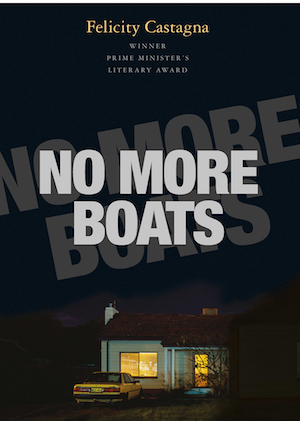Fiction – Kindle edition; Giramondo; 264 pages; 2017.
Immigration, including how we deal with refugees, asylum seekers and economic migrants, is arguably the issue of our times. Felicity Castagna explores this often controversial subject in her novel No More Boats, which has been shortlisted for this year’s Miles Franklin Literary Award.
In Australia, the slogan “no more boats” is shorthand for anti-refugee sentiment, which has latterly become (shameful) Government policy designed to stop asylum seekers arriving illegally by sea. Most of these refugees come via Indonesia on flimsy, overcrowded boats, risking everything for a chance at a new life. (This article on the BBC News website explains why this policy is so controversial; and this memoir, by Dr Munjed Al Muderis, provides a shocking first-hand account of what it is like to be one of those refugees.)
Castagna’s novel looks at the thorny issue of what happens when a postwar Italian migrant rails against 21st century newcomers arriving in the country.
Making a statement
Antonio Martone has made a successful career in the construction industry but a workplace accident, which killed his friend, has left him badly injured and now, with too much time on his hands, his life — and his mental state — is slowly beginning to unravel.
The story, which is set in Sydney’s ethnically diverse Parramatta, takes a while to get going. Castagna takes her time introducing us to a wide cast of characters, including Antonio’s downtrodden wife, Rose, and the couple’s two adult children, Clare and Francis, and weaves their individual stories into a wider narrative that also takes in the 2001 Tampa crisis, in which a Norwegian ship carrying 433 rescued refugees was forbidden from entering Australian waters. (You can read about this incident on the National Museum of Australia website.)
The pivotal moment occurs when Antonio, inspired by the ghost of his dead friend, paints a political slogan in his front garden of the family’s suburban home. Here’s how Francis, coming upon it for the first time, describes it:
Now he was turning the corner. Now he was looking towards his home from across the street. Now he was noticing that a large piece of the white picket fence had fallen down and was lying on the pavement. Now he was slapped in the face by that giant image in blue paint that took up every inch of the concrete lawn in front of his house. No More Boats. It was written in shaky letters in the middle of a circle with a slash through it. On further inspection Francis saw that a little sail boat was drawn in there too underneath the lettering, in case someone didn’t get the message.
Of course, this attracts all kinds of unwanted attention — from the neighbours, stickybeaks, the media and political campaigners on both sides of the argument — and puts Antonio’s family in a difficult, and precarious, situation.
Contemporary Australian life
No More Boats is an illuminating, fast-paced read, very much focused on contemporary life in Australia and its uneasy relationship with its migrant past.
It feels like a “light” read but it has a surprising resonance and plangency.
The urban setting, together with its exploration of the complicated relationships between generations and the cultural baggage carried by the children of immigrants, brings to mind the best of Christos Tsiolkas’ work.
I found it a compelling yet thoughtful look at our sense of home, belonging, what it means to assimilate and how the deeds and words of politicians can have a dramatic, long-lasting impact on the views of the populace. But having raced through it back in early July, I found writing this review — some six weeks later — a bit of a struggle because not very much of the storyline stuck.
For another take on this novel, please see Lisa’s review at ANZ LitLovers.
This is my 15th book for #AWW2018, my 12th for #20booksofsummer and my 4th for the Miles Franklin Literary Award 2018. I bought it after it made the Miles Franklin longlist in late May because it sounded like something I’d be interested in and I was delighted when it made the shortlist, if only because I planned to read everything on it this year.


Thanks for the mention, Kim. This book is more timely than ever with the way federal politics are at the moment!
LikeLiked by 1 person